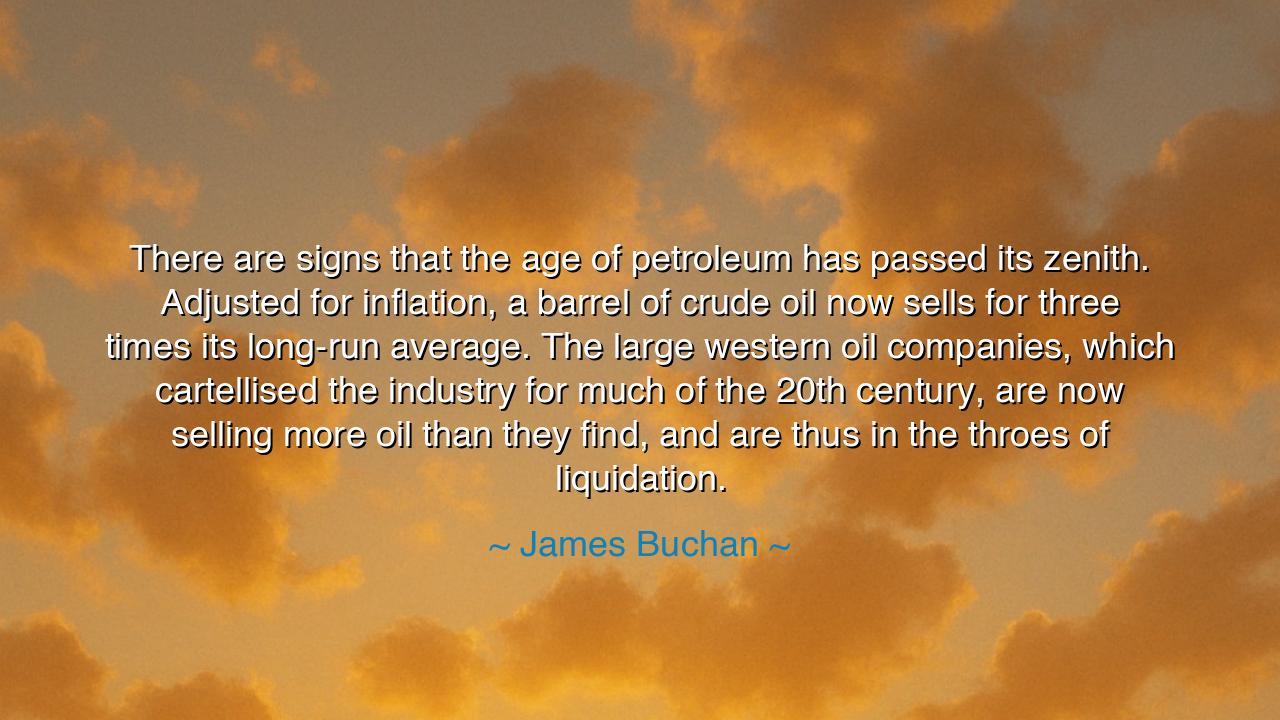
There are signs that the age of petroleum has passed its zenith.
There are signs that the age of petroleum has passed its zenith. Adjusted for inflation, a barrel of crude oil now sells for three times its long-run average. The large western oil companies, which cartellised the industry for much of the 20th century, are now selling more oil than they find, and are thus in the throes of liquidation.






"There are signs that the age of petroleum has passed its zenith. Adjusted for inflation, a barrel of crude oil now sells for three times its long-run average. The large western oil companies, which cartellised the industry for much of the 20th century, are now selling more oil than they find, and are thus in the throes of liquidation." – James Buchan
In the ancient world, the rise and fall of empires were often measured by the ebb and flow of resources, the lifeblood of civilizations. Petroleum, the black gold that has powered much of the modern world, is no different. James Buchan, with the keen eye of a scholar, gazes upon this modern age and sees a truth that many refuse to acknowledge: the age of petroleum has reached its zenith. Like the rise of the great empires of old, this era, once filled with promise and power, is now beginning its slow, inevitable decline. The very oil companies that once held dominion over the world’s energy resources are now in the throes of liquidation, scrambling to maintain relevance in a world that has outgrown their once-untouchable power.
In times long past, Rome was fueled by its conquests and its expansion of resources, particularly the wealth extracted from lands far and wide. But as all great empires fall, so too does the story of petroleum. Just as the Roman Empire reached its peak and then faltered under the weight of its own excesses, so too has the oil industry, built on the certainty of endless supply and the unchecked thirst for energy, come to a moment of reckoning. The warning is clear: no empire, no industry, no resource is eternal. The time comes when the well runs dry, when what was once abundant becomes scarce, and the mighty must reckon with their own vulnerability.
The age of petroleum, which has shaped much of the 20th century, has seen great triumphs. From the industrial revolution to the rise of global markets, oil has been the backbone of modern civilization. It has driven not just machines, but entire societies—sprawling cities, endless highways, and the very fabric of international trade. But the price of a barrel of oil, three times its long-run average, signals a shift in the wind—a change in the direction of the tides. The great western oil companies, once the untouchable titans of industry, are now selling more oil than they can find, and in doing so, are hastening their own decline.
There is an ancient story from Mesopotamia, the cradle of civilization, of a king who sought to control all the waterways and trade routes of his empire. He believed that by holding the key to these resources, he would remain eternally in power. Yet, as time passed, the king’s empire crumbled not because his resources ran out, but because he failed to recognize that the world itself was changing. New routes were forged, new powers rose, and the once-untouchable empire withered away. The story echoes today, as the oil industry faces the reality that it cannot forever sustain its dominance, and that the resources upon which it once relied are no longer infinite.
The lesson here is as old as the rise and fall of kingdoms: nothing lasts forever, not empires, not industries, and not resources. What once seemed like an unshakeable foundation, the very fuel of the world’s economies, is now beginning to show cracks. The great oil companies that once ruled the globe with near impunity now face the uncomfortable truth that they have overextended their reach. They have consumed more than they have replenished, and the reckoning is at hand. The liquidation they face is not just of oil, but of the systems that once propped them up.
The wisdom here is simple yet profound: adaptation is the key to survival. Just as the ancient civilizations fell when they failed to adapt to new realities, so too must we, in the modern age, adapt to the changing tides of resources and energy. We must recognize that the age of petroleum, like all things, has its limits. To continue on the path of sustainability, we must invest in renewable energy, in sources that are not finite, in systems that honor the delicate balance of our world. To depend solely on one resource, one foundation, is to risk becoming like those ancient empires, once powerful, now forgotten.
In practical terms, we must shift our gaze from the horizon of oil and towards the rising sun of renewable energy. The lesson from the decline of the oil empire is clear: we must not wait for the inevitable fall, but act now to diversify and build systems that can stand the test of time. The future does not belong to the industries that cling to the past, but to those that innovate and evolve. Sustainability is not just a choice; it is the only path forward. The age of petroleum has passed, and it is our task, as stewards of the earth, to ensure that we do not repeat the mistakes of those who failed to see the end of their reign.






AAdministratorAdministrator
Welcome, honored guests. Please leave a comment, we will respond soon